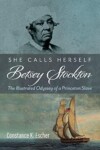Title: She Calls Herself Betsey Stockton
Author: Constance K. Escher
Publisher: Resource Publications
ISBN: 978-1-7252-7544-7
Pages: Pages 197
Genre: Historical Biography
Reviewed by: Carol Davala
Pacific Book Review
 Blending scholarly research and archival journal entries reminiscent of Captain Ahab’s seafaring ventures in Moby Dick, author Constance K. Escher’s She Calls Herself Betsey Stockton showcases an impressive account of an extraordinary Mulatto woman who was born into slavery, but ultimately became one of the most widely traveled, educated, and socially active individuals of her time.
Blending scholarly research and archival journal entries reminiscent of Captain Ahab’s seafaring ventures in Moby Dick, author Constance K. Escher’s She Calls Herself Betsey Stockton showcases an impressive account of an extraordinary Mulatto woman who was born into slavery, but ultimately became one of the most widely traveled, educated, and socially active individuals of her time.
As a historical biographer, Escher’s interest in Stockton began when she came across a photograph of the former slave. Findings indicated the photo was taken in 1863 at the same time as those of Rev. Charles Stewart, known for his published detesting of the slave trade, and renowned Abolitionist, Frederick Douglas. It seemed a rare image as few portraits of prominent individuals of color appear to exist within historical records.
Born into slavery on Robert Stockton’s Princeton farm, Betsey was given to Stockton’s daughter Elizabeth as part of her marriage dowry to Rev. Ashbel Green. With Green’s presidency of the College of New Jersey (later Princeton) and his establishment of the Princeton Theological Seminary, Betsey’s education and lessons advanced far beyond the traditional household skills of cooking, housekeeping, and nursing. Highly recommended in pursuit of missionary work, Betsey joined Rev. Charles Stewart and his wife Harriet as they endured a lengthy voyage to the Sandwich Islands. Adding to the book’s authenticity, several archival photos are included along with numerous diary entries, as Escher reveals the triumphs and tribulations of their journey. From the rough seas and encountered slave ships, to prayer and worship, and the birth of the Stewart’s son, such detailed journaling not only helps personalize the story, but it serves as a smart contrast to the more academic aspects of the narrative. Betsey Stockton’s learning to speak the Hawaiian language proved a major benefit to her work. This unlikely poster woman for literacy in the Pacific helped instill the desire for “palapala” (writing and new learning) not only for the royals, but for the common Islanders as well. After the Stewarts and Stockton left the Islands, Betsey continued to serve the couple and became a surrogate parent to the children after Harriet Stockton’s passing.
Stockton soon went on to establish and teach school in Philadelphia, PA; Grape Island, Canada; and eventually in her hometown of Princeton, NJ. Here, instructional methods were based on a model of the Wilderspin/Pestelozzi system now adopted by contemporary Montessori and Wilberforce schools that focus on a child-centered way of teaching.
Betsey Stockton also became recognized as a church pillar in the Princeton community. Equating reading with freedom, she exemplified the power of Black women in the church to help shape the fabric of society. A memorial plaque was placed in the Witherspoon Street Presbyterian Church in honor of her lasting achievements. In recent years, Betsey Stockton’s connection to Princeton celebrity has resulted in Princeton University naming a garden for her, and the Princeton Theological Seminary announcing the installation of the “Betsey Stockton Research Center” within its Speer Library.
Escher’s biography is a solid, quality work that follows Betsey Stockton’s path and brings it to life. She Calls Herself Betsey Stockton WON the NJ Author Alliance Award, 2022, for BEST Scholarly non-fiction biography. Also, the author has been notified this book is in line for the Richard P. McCormick Prize, by the New Jersey Historical Commission.
The book’s closing with a chronology, a guide for reading groups, and an extensive source bibliography, should prove useful for those whose interest is peaked by the tenacity and major accomplishments of a freed and educated slave who proved to be a remarkable woman.



Follow Us